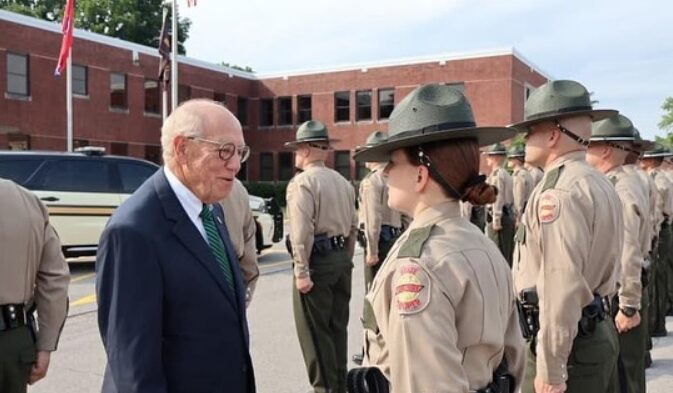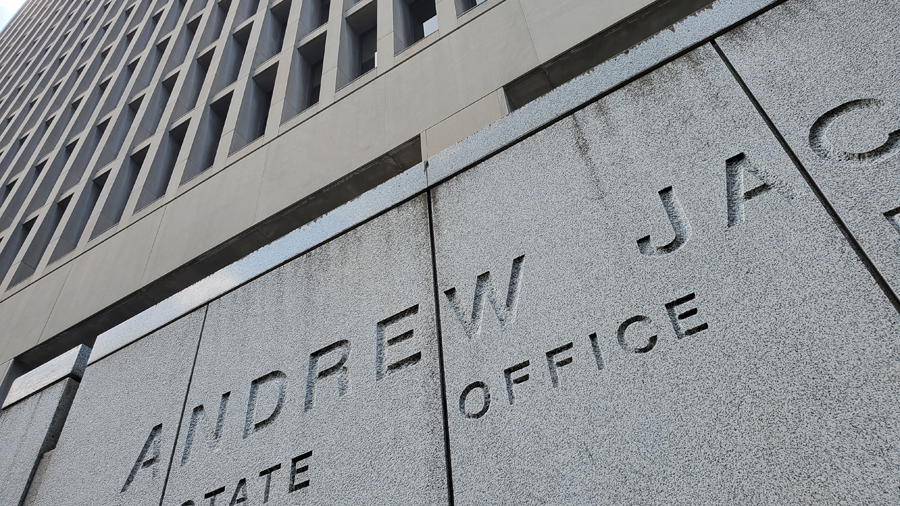
Jeff Long, safety commissioner, visits state troopers who alone are authorized in law to administer the motor vehicle code. Using troopers, he runs an extortion operation serving insurance companies under color of sect. 139 of the financial responsibility law. (Photo DOSHS)

This Nashville tower houses the state department of revenue, which is embroiled in the Eye of Sauron scandal. (Photo David Tulis)

Boyd Patterson, chief judge in Hamilton County, Tenn.
CHATTANOOGA, Tenn., Nov. 28, 2024 — Criminal court judge Boyd Patterson is blunting my petition to overthrow the financial responsibility fraud in Nashville with an order questioning whether my case can invoke the 3-judge panel to hear it.
The three-judge panel is a new anti-corruption court into which I’m making appeal to overthrow the Eye of Sauron, run by David Gerregano, commissioner of revenue. The special court hears challenges to government violations of the constitution or law.
I filed Nov. 1 in the chancery court of Hamilton County a 93-page petition regarding my prosecution to halt datamining surveillance used to snag poor people who are not customers of the insurance industry and force them off the road.
Revenue and department of safety — and all cops and deputies as their agents — compel people to buy insurance they do not need to obtain policy cards that are not legally sufficient.
The only people subject to the glaring eyeball treatment are those with certified “motor vehicle liability policies,” as the law calls them.
The only people who have certified policies are those people under suspension who have conditional use of the privilege. The privilege is operating and driving a motor vehicle, one of numerous callings or occupations the state regulates as owner.
Short take ——————————
— People forced to buy insurance they do not need to obtain policy cards that are not legally sufficient.
— Patterson graciously asks for constitutional breach evidences
These suspendees may pursue their livelihoods in a motor vehicle on condition of insurance because they have violated the Tennessee financial responsibility law, are hit by a civil court judgment in a traffic crash or are convicted of DUI for motoring criminal or administrative offense. They commit to conditional use obligations — inurance — up to five years.
The abusive program has ensnared one of my cars and revoked the tag. That was July 2023. The corporate capture sythe is now swinging its blade toward a second car, that being my 1999 Toyota RAV4, with 300,000 miles, a wonderful little car that smells deeply of oil and worn seats, but in which I lovingly, tenderly travel. Its high status as motor vehicle is due to be revoked Dec. 27.
Judge asks details on unconstitutionality
I’m thankful, however, that Judge Patterson in his Nov. 19 order does not absolutely shut the door on the case. He effectively asks me to condense my material and to emphasize more than I do in my initial filing the unconstitutionality of the harms I’m alleging.
It seems to me that the 29 breaches of the statute that I highlight in the complaint should be sufficient to indicate the program is completely off the rails and operating independently of the law in an arbitrary and capricious manner. But, he insists, show me where these abrogations implicate or abrogate constitutionally guaranteed rights.
Judge Patterson titles his order an “initial determination.” He admits at least a “sliver of a potentially meritorious claim” that it says lie “buried within a 93-page complaint, supported by another 72-pages of exhibits, which overwhelmingly decry less of a constitutional violation and more of a statutory misapplication.”
Abuse of statute may not be enough, he indicates, to get before the three-judge panel. So, his order of denial leaves me opportunity to secure unconstitutionality in my claim
He goes on to say, “Perhaps this court oversteps its role in searching the pleadings for any potentially meritorious claim that simply might not have been articulated with sufficient legal precision. Yet even after that search, the only claim that potentially merits convening a three-judge panel seems more of an afterthought.”
He says my claims “as presented fit better within the framework of a statutory interpretation matter and not a constitutional challenge.” Therefore, my petition “does not qualify for a three-judge panel.”
He hints my ardor for righteous government maybe to my discredit, balanced out by “sincerity and commitment to combat government overreach” that “remain well-known in this jurisdiction.”
Support David ministry of mercy, legal combat
I readily take up the invitation to delve into the unconstitutionality of the program in defense of the written law at T.C.A. § 55-12-101 called the Tennessee financial responsibility law combined with its amendments that took effect in 2017, the Atwood law. The surveillance system is created by Atwood, passed by the general assembly. The general assembly members, able to give an average of 7 minutes of their time to any one bill, full of trust, heeded Rep. William Lamberth, a lawyer and former prosecutor. He repeatedly lies about the law, one that nobody appears to have read. He created the Atwood amendment in 2015 that took effect Jan. 1, 2017.
The commission of revenue argues legislative intent is needed in the case, though Cmsr. Gerregano admits it is “unambiguous.” Generally a court will use legislative history only with an ambiguous word, phrase, sentence, paragraph or provision.
Judge Patterson faults relator for not having submitted a notice with his filing required by supreme court rule No. 54. I file the three-page notice Wednesday in the chancery court clerk’s office prior to its noon closing in celebration of Thanksgiving. It goes in with my motion on constitutional issues, for God’s glory and man’s benefit.


An officer violates the Tennessee Constitution when he/she arrests one of the people without any evidence of a crime, and issues an accusation on behalf of the municipal corporation of “driving,” with no evidence that the man or woman is engaged in that commercial activity.
Commission of that assault constitutes a violation of the right to life, and liberty, which is regarded as property of people, under law of Tennessee.
It is plain to see that the federal transportation code is a “Bill of Attainder,” when/if applied against people in their harmless and peaceful activities of life.
A “bill of attainder” is unconstitutional and violative of people in every state of America.